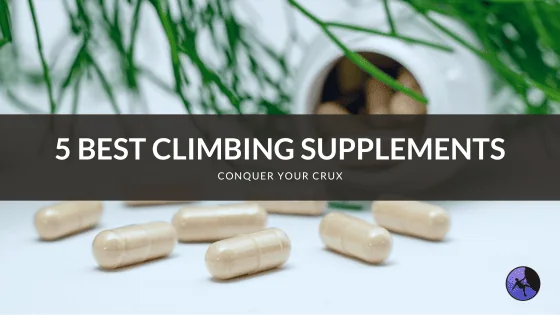Like any other physical activity, rock climbing takes a toll on your body. As climbers want to improve their abilities more and more, they will likely start looking for ways to help their body support their new skills. One way that many athletes support their bodies is by taking supplements. Supplements are something that you take in addition to having proper nutrition to help fill any dietary gaps you may have.
Figuring out what supplements are best for you can be challenging, but that’s why we’re here to help. First, you’ll need to figure out your goals for climbing, and then we can help guide you in the right direction for what supplements might help you achieve those goals.
 What is Good Nutrition for Climbers?
What is Good Nutrition for Climbers?
Nutrition is something that can improve your climbing ability when you pay attention to the nutrients that you put into your body. Climbers have historically not been known for having the best nutrition, but competitive climbers and elite climbers have been slowly changing that reputation. Climbers like Brad Gobright were known for their poor diet and poor nutrition, but that doesn’t mean they wouldn’t benefit from better nutrition.
As with any physical activity, good nutrition includes a balance of different nutrients and minerals to help support your body through both muscle development and recovery. Make sure you are getting all of your necessary vitamins and minerals before you think about adding supplements. Supplements are just that; they should supplement your existing diet.
Another thing to pay attention to when doing any physical activity is the amount of protein you are consuming. Protein helps keep you full and is necessary for building and maintaining muscles. You can get protein from supplements, like protein powders, but this shouldn’t be your main source of protein.
 Should Climbers Take Supplements?
Should Climbers Take Supplements?
Taking supplements or not is a personal choice and comes down to a few factors. First, it’s important to realize that supplements are not going to fix all your problems, so you have to be taking care of yourself first.
For example, if you take an iron supplement to help improve your energy levels, but you actually are eating enough iron, the supplement won’t help and will instead be a waste of money.
Next, you’ll want to consider if you climb enough to see a benefit from supplements. Competitive climbers or elite climbers will probably find supplements that benefit their practices, but for an evening climber who loves to hang out at the gym and chat and climb, supplements might not be the best fit.
Ultimately, taking supplements as a climber is similar to taking a supplement as any other athlete. There are supplements that might help you, but you have to weigh the pros and cons of taking the supplement to decide if it is worth it to you.
 When to Take Food Supplements?
When to Take Food Supplements?
Knowing when to take a supplement can seem challenging, but it doesn’t have to be. Each supplement manufacturer will have recommendations for how to use their product. The best recommendation that we can offer you is to follow the guidelines set by the product manufacturers unless your doctor or other medical professional tells you otherwise.
 5 Best Climbing Supplements
5 Best Climbing Supplements
Here are some of the best climbing supplements out there. We recommend thinking about what your goals are and then comparing your goals with the benefits and costs of some of these supplements to help you figure out how to find the best climbing supplements for you.
1. Creatine
Creatine is naturally created by the body, but your body typically needs about twice as much as it creates. This deficiency is made up in your diet, but you can always supplement it with a powder. The benefits of taking creatine have been seen in lots of studies, with most citing that creatine will help your muscles replenish their exerted energy faster and increase overall strength. Creatine for climbers is an excellent way to support your muscles.
2. Whey Protein
Whey protein is a great option for someone looking to increase their protein intake. There are tons of different whey protein powders on the market, so pick a flavor that sounds good to you and give it a try. Research the company to see if you like the ingredients they use since some powders are vegan or vegetarian while others are not.
3. Omega 3
Omega 3 is touted as having tons of benefits and is typically a great supplement for most people. Omega 3 for climbing training can help support joint health and reduce inflammation, although there are plenty of other benefits as well. Omega 3 can come from your diet, particularly from fatty fish, but if you don’t eat many of these fish, it may be worth supplementing your intake.
4. L-theanine
L-theanine is often said to be one of the best supplements climbers can add to their routine. It is a naturally occurring amino acid that can be found in food like green tea and some types of mushrooms. L-theanine is a great way to get rid of your pre-climb jitters and focus on what you have to do. Many people combine it with caffeine to get a big kick of energy before a challenging climb.
5. Collagen
Collagen for climbers is much more than a skin supplement; it is a great joint supplement for climbers. Taking collagen has become a popular thing to do to benefit your skin and hair, but many studies have shown that collagen supplements can help improve joint health, making it a great option for climbers.
Wrapping Things Up: 5 Best Climbing Supplements
It’s important to understand that sports nutrition for rock climbing is the same as sports nutrition for any other sport. Making sure that the food you are fueling your body with, as well as any supplements you take, are all helping you achieve your goals is the key to success.
Regardless of whether you use protein powder to help reach your daily protein allowance or L-theanine to get a little bit of extra focus when climbing, there is something out there if you want it but don’t feel like you have to take supplements to be the best climber either. Just do what is best for you and your body.

 What is Good Nutrition for Climbers?
What is Good Nutrition for Climbers? Should Climbers Take Supplements?
Should Climbers Take Supplements? When to Take Food Supplements?
When to Take Food Supplements? 5 Best Climbing Supplements
5 Best Climbing Supplements

